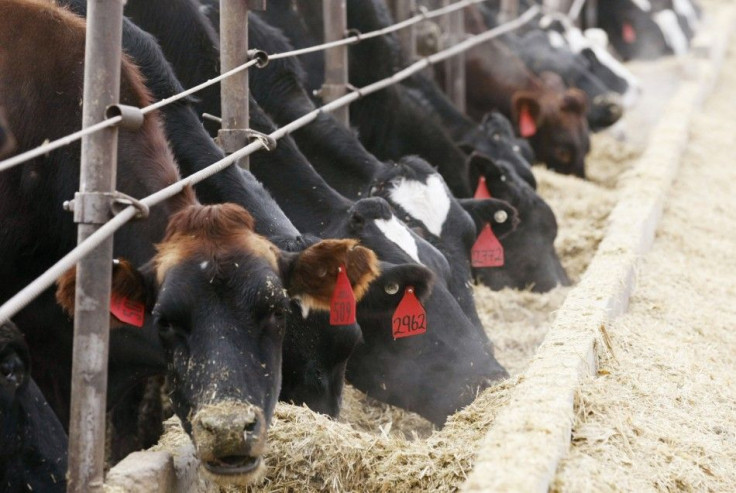Antibiotic-Resistant MRSA Strain Developed in Livestock Can Spread to Humans

Antibiotic-resistant bacteria fostered in livestock through widespread antibiotic use can be transferred to humans, a new study in the journal mBio has shown.
It has long been argued by scientists and many government officials that including antibiotics in the feed of animals, such as pigs and cattle, would lead to the develeopment of antibiotic-resistant germs that could then be passed back to humans. This study adds increased weight to the argument.
The journal study, published by the American Society for Microbiology, focused on a strain of staph bacteria called CC398, a methicillin-resistant Staphylococcus aureus (MRSA), known as the pig MRSA.
Research illustrated how the germ passed from humans to pigs, where resistance to tetracyline and methicillin was developed, before the antibiotic-resistant strain returned to humans.
We're seeing this one coming, said Lance Price of the Translational Genomics Research Institute, or TGen, in Flagstaff, Arizona, according to NPR. The question is how often will this occur in the future if we don't start controlling antibiotic use?
The use of antibiotics in animal feed has become increasingly prevalent in livestock feed to foster animal growth and reduce infections from spreading around the animals in conditions designed to promote mass production. However, the increased use of these drugs results in antibiotic-resistant bacteria strains being developed in the animals.
The overuse of antibiotics in food animals for growth promotion allows for various strains of antibiotic-resistant bacteria, said Dr. Marcus Zervos, chief of infectious diseases at Henry Ford Health Systems in Detroit, according to ABC News.
If we continue to use antibiotics in food animals, especially for unneeded reasons, the infections will become antibiotic resistant and make their way into people.
The European Union banned the use of antibiotics in livestock in 2006, but the U.S. has so far failed to follow suit.
We haven't endorsed that approach in the U.S., but I think Europe is further ahead than we are, Zervos said. It's not just the tonnage of antibiotics we use here, but we also use every major class of antibiotics that is used in food animals is used in people, and it doesn't look like there's any trend in reducing that unneeded use.
According to the American Society for Microbiology, half of all meat sampled by U.S. commerce contained the pig MRSA strain, reported NPR. While it can generally be removed by cooking the meat adequatelty, risk of exposure can still occur by unsafe handling methods, especially if it comes into contact with other foods.
The issue has long been a cause of contention, with the use of antibiotics in livestock fiercely defended by the U.S. meat industry. Indeed a fact sheet published by the American Meat Institute expressly denies any link between antibiotic use in animals and antibiotic resistance in humans.
There is a misconception that somehow consuming meat from animals treated with antibiotics will cause humans to become resistant to those antibiotics. This is simply not the case, it states.
Most informed scientists and public health professionals acknowledge that the problem of antibiotic resistance in humans is overwhelmingly an issue related to human antibiotic use.
Currently 80 percent of all antibiotics in the U.S. goes to animals. While currently human developing the antibiotic-resistant strain, in parts of the Netherlands it is responsible for up to one in four MRSA cases in humans, according to NPR.
The Food and Drug Administration, in charge of regulating these practices, has been indecisive on the issue. Last December the FDA withdrew a proposal that had been in place since 1977, limiting the use of antibiotics in animal feed.
This came despite the FDA notice at the time stating that the updated regulation did not mean that the FDA no longer has safety concerns about the use of medically important antibiotics in food producing animals.
Despite their concerns, the FDA claimed that they would subsequently focus on promoting voluntary reform.
Shortly after, demonstrating their uncertainty on how to handle the issue. the FDA then made a partial concession in its policy last month when it ordered the limit of using the type of antibiotics, Cephalosporins, according to the Huffington Post.
© Copyright IBTimes 2024. All rights reserved.





















